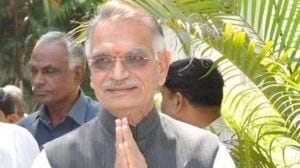Report gives clean chit to Apollo, AIIMS; Minister Thakur suggests committee to confirm the findings
NEW DELHI, OCTOBER 4: The results of the government's expert committee report which looked into the death of former power minister P R Kum...

NEW DELHI, OCTOBER 4: The results of the government’s expert committee report which looked into the death of former power minister P R Kumaramangalam proved to be a whitewash, with the ministry of health exonerating both Apollo and the All India Institute of Medical Sciences (AIIMS).
But the controversy may not end with the report. Union Health Minister C P Thakur has said the report was “not clear”, and added that “another committee will be needed for the confirmation of the findings”. “We are not blaming anyone but looking back and examining whether something better could have been done,” said Thakur. He denied reports that he had called Kumaramangalam’s wife, Kitty, and offered to withhold the report, if she so wanted.
The report concludes that “the most significant contribution towards the final outcome in the case of Sri Kumaramangalam was the fact that the patient did not receive any appropriate medical advice for over three months following his discharge from Apollo hospital till his final admission at AIIMS.”
While Kumaramangalam’s family expressed “shock” over the report, the late minister’s attending physician at Apollo, Dr Prasada Rao, said he was relieved. “I feel vindicated because this is what we had been telling them all along, but I also feel sad that we were tried without scientific proof.”
The minister said the 13-page report was in its original form and had not been sanitised by the government. He said that report was slimmer than expected — it had been reported to be 30 pages earlier — because medical anexures had been excluded.
The report notes that while the white blood cells were in the normal range, differential counts showed decreased neutrophils, “which could have been further investigated.” But it adds that since Kumaramangalam was keen to go home, he was discharged and asked to come for follow-up visits, which he failed to do. This lack of follow-up treatment has been suggested as the cause for the 48-year-old minister’s death.
The report also mentions that the minister had occasionally been taking asteroid called Wysolone — “for body ache and exhaustion, though he was not addicted to it,” the report quoted his wife — without telling his physician, which could have masked or altered clinical symptoms.
“Kumaramangalam had been using this steroid between ’77-’83 to treat an eye complication, but I am still not aware that he had continued to do so,” said Prasada Rao.
The ministry concluded that had the treatment after discharge from the hospital been followed up with the same treating physician, perhaps the persistently low blood count may have prompted further tests, including bone marrow examination.
It suggests that the increase in atypical lyphocytes suggest Non-Hodgkins Lymphoma, but cytochemical stains and immunophenotyping were necessary to confirm this diagnosis.
- 01
- 02
- 03
- 04
- 05































